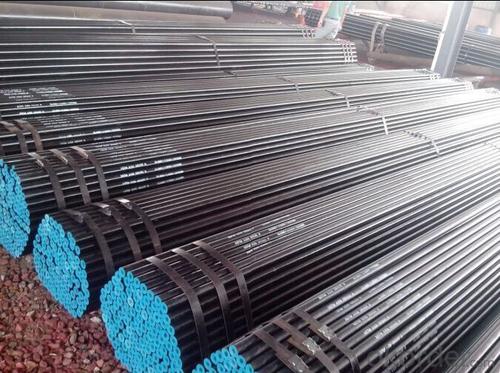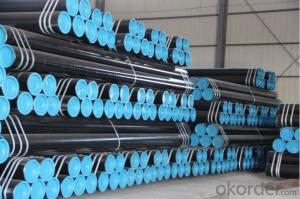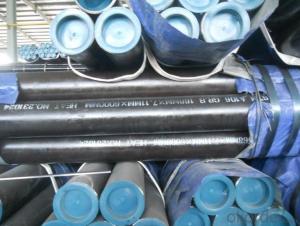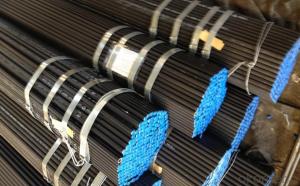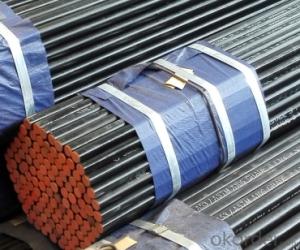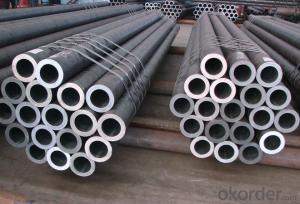Carton Seamless standard pipe ASTM A53/API 5L
- Loading Port:
- Tianjin
- Payment Terms:
- TT or LC
- Min Order Qty:
- 25 m.t.
- Supply Capability:
- 5000 m.t./month
OKorder Service Pledge
OKorder Financial Service
You Might Also Like
1、Structure of Carton Seamless standard pipe ASTM A53:
Seamless pipe is formed by drawing a solid billet over a piercing rod to create the hollow shell. As the manufacturing process does not include any welding, seamless pipes are perceived to be stronger and more reliable. Historically seamless pipe was regarded as withstanding pressure better than other types, and was often more easily available than welded pipe.
2、Main Features of Carton Seamless standard pipe ASTM A53:
• Small inertia resistance
• Strong heat dissipation ability
• Good visual effect
• Reasonable price
• High manufacturing accuracy
• High strength
3、Carton Seamless standard pipe ASTM A53 Specification:
Standard | GB, DIN, ASTM ASTM A106-2006, ASTM A53-2007 |
Grade | 10#-45#, 16Mn 10#, 20#, 45#, 16Mn |
Thickness | 8 - 33 mm |
Section Shape | Round |
Outer Diameter | 133 - 219 mm |
Place of Origin | Shandong, China (Mainland) |
Secondary Or Not | Non-secondary |
Application | Hydraulic Pipe |
Technique | Cold Drawn |
Certification | API |
Surface Treatment | factory state or painted black |
Special Pipe | API Pipe |
Alloy Or Not | Non-alloy |
Length | 5-12M |
Outer Diameter | 21.3-610mm |
Grade | 20#, 45#, Q345, API J55, API K55, API L80, API N80, API P110, A53B |
Standard | ASME, ASTM |
1) Material:20#(ASTM A 106/A53 GRB.API5LGRB,GB),45#,16Mn,10#.
2) Specification range:OD:21.3-610mm,WT:6-70mm,length:6-12m or according to the requirement of clients.
3) Excutive standards:GB,ASME API5L.ASTM A 106/A53,Despite of the above standards,we can also supply seamless steel pipe with standard of DIN,JIS,and so on,and also develop new products according to the requirements of our clients!
4) Surface:black lacquered,varnish coating or galvanized.
5) Ends:Beveled or square cut,plastic capped,painted.
6) Packing:bundles wrapped with strong steel strip,seaworthy packing.
4、Packaging & Delivery
Packaging Details: | seaworthy package,bundles wrapped with strong steel strip |
Delivery Detail: | 15-30days after received 30%TT |
5、FAQ of Carton Seamless standard pipe ASTM A53:
①How is the quality of your products?
Our products are manufactured strictly according to national and internaional standard, and we take a test
on every pipe before delivered out. If you want see our quality certifications and all kinds of testing report, please just ask us for it.
Guaranteed: If products’ quality don’t accord to discription as we give or the promise before you place order, we promise 100% refund.
②How about price?
Yes, we are factory and be able to give you lowest price below market one, and we have a policy that “ for saving time and absolutely honest business attitude, we quote as lowest as possible for any customer, and discount can be given according to quantity”,if you like bargain and factory price is not low enough as you think, just don’t waste your time.Please trust the quotation we would give you, it is professional one.
③Why should you chose us?
Chose happens because of quality, then price, We can give you both.Additionally, we can also offer professional products inquiry, products knowledge train(for agents), smooth goods delivery, exellent customer solution proposals.Our service formula: good quality+good price+good service=customer’s trust
SGS test is available, customer inspection before shipping is welcome, third party inspection is no problem.
6、Carton Seamless standard pipe ASTM A53 Images:
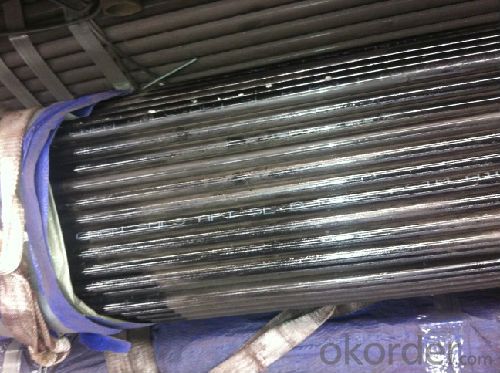
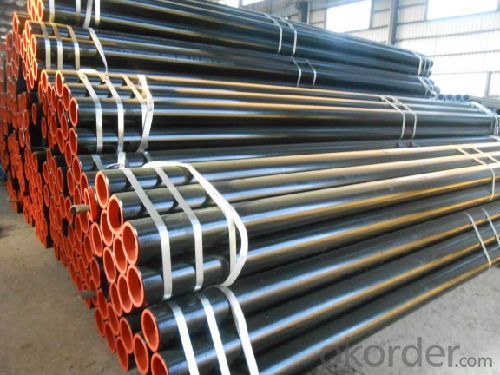
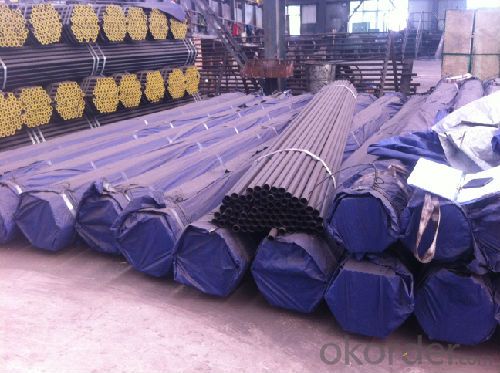
- Q: How are steel pipes used in the construction of desalination plants?
- Steel pipes are used in the construction of desalination plants for various purposes such as transporting seawater, brine, and treated water, as well as for structural support in the plant's infrastructure. These pipes are durable, corrosion-resistant, and capable of withstanding high-pressure conditions, making them ideal for the harsh and corrosive environment of desalination plants.
- Q: What are the standard dimensions for steel pipes?
- The standard dimensions for steel pipes vary depending on the application and industry. However, common sizes range from ½ inch to 48 inches in diameter and have various wall thicknesses based on the required strength and pressure rating.
- Q: What material is RHS in the steel tube?
- The CHS structure represents thin-walled round steel tubes, in which materials are referred to Taiwan CHS's steel and are used to indicate the series of anti rust paints used in metal materials.
- Q: What is the flexibility of steel pipes?
- Steel pipes possess exceptional flexibility, rendering them highly versatile and suitable for a wide array of applications. Their flexibility is derived from the inherent properties of steel, such as its high tensile strength and ductility, enabling them to bend and endure various forms of stress without breaking or deforming. The structural integrity of steel pipes remains intact even when bent or shaped into different forms. This facilitates simpler installation and routing around obstacles, making them more adaptable for intricate plumbing or piping systems. Furthermore, the flexibility of steel pipes allows them to withstand external forces like ground movements or temperature fluctuations without sustaining significant damage. Moreover, the flexibility of steel pipes makes them ideal for applications that involve dynamic movement or expansion. In the case of oil and gas pipelines or heating and cooling systems, where temperature variations can lead to expansion and contraction, steel pipes can accommodate these changes without causing leaks or failures. Additionally, the flexibility of steel pipes contributes to their durability and longevity. The ability to endure bending and stress prevents the formation of cracks or fractures that could result in leaks or structural failures. This characteristic establishes steel pipes as a dependable choice for demanding environments, including high-pressure systems or corrosive conditions. To sum up, the flexibility of steel pipes is a crucial attribute that allows for effortless installation, adaptability to diverse conditions, and long-term reliability. Due to their remarkable flexibility, steel pipes are extensively preferred in numerous industries and applications where strength, durability, and versatility are paramount.
- Q: Are steel pipes suitable for underground drainage systems?
- Indeed, steel pipes prove to be a fitting choice for underground drainage systems. The multitude of qualities possessed by steel pipes contributes to their popularity in this field. Firstly, their robustness and endurance enable them to withstand high levels of pressure and heavy loads. Moreover, steel pipes are resistant to corrosion, which prolongs their lifespan and reduces the need for frequent maintenance or replacement. Furthermore, steel pipes possess the advantage of adaptability and versatility in various soil conditions. They can be easily customized to match the specific requirements of the drainage system, encompassing different diameters and lengths. Additionally, steel pipes can be welded together, ensuring a secure and tight connection that effectively prevents leakage and the infiltration of groundwater. Another benefit of utilizing steel pipes in underground drainage systems lies in their capability to handle a wide range of temperatures. Their resistance to extreme heat or cold renders them suitable for diverse climates and environments. Nevertheless, it is important to acknowledge that steel pipes can be more costly compared to alternative materials such as PVC or HDPE pipes. Additionally, their weight and installation process may pose challenges, necessitating specialized equipment and expertise. In conclusion, steel pipes provide a dependable and long-lasting solution for underground drainage systems, particularly in regions where durability and strength are vital considerations.
- Q: How do steel pipes compare to other materials like PVC or copper?
- Steel pipes have several advantages over other materials like PVC or copper. Firstly, steel pipes are incredibly strong and durable. They can withstand high pressure and extreme temperatures without cracking or bending. This makes them ideal for heavy-duty applications such as industrial piping systems or underground installations. Secondly, steel pipes have excellent corrosion resistance. Unlike copper pipes that can corrode over time, steel pipes are typically coated with anti-corrosive materials such as zinc or epoxy. This protective layer prevents rust and ensures a longer lifespan for the pipes. Furthermore, steel pipes offer superior fire resistance compared to PVC or copper. They are non-combustible and can withstand high temperatures for extended periods without deforming or releasing toxic gases. This makes steel pipes a safer option for applications where fire hazards are a concern. In terms of cost, steel pipes may be more expensive than PVC initially, but they offer better long-term value due to their durability and longevity. Copper pipes, on the other hand, can be quite expensive and are susceptible to theft due to their scrap value. Lastly, steel pipes are highly versatile and can be used in various applications, including water supply, sewage systems, gas pipelines, and oil refineries. They can handle high volumes of fluid with ease and are resistant to external factors like UV rays or physical impacts. Overall, steel pipes are a reliable and efficient choice for many industries and applications, offering strength, durability, corrosion resistance, fire resistance, and versatility that sets them apart from materials like PVC or copper.
- Q: What are steel pipes?
- Steel pipes are cylindrical tubes made of steel that are used for conveying fluids or gases, as well as for structural purposes in various industries.
- Q: Can seamless steel pipe and ordinary steel pipe be welded?
- Steel pipe and seamless linking points, you said should refers to ordinary steel pipe joints, if only consider the butt welding problem, two kinds of steel can be welded. But the mechanical properties of the seamless steel pipe and tube with different, generally the main difference is the two kinds of steel can withstand the pressure of the former than the latter to be good.So if your project is seamed steel pipe can be, then the two pipe welding, welding and butt welding interface is completely no problem.
- Q: Can steel pipes be used for underground drainage in acidic soils?
- Yes, steel pipes can be used for underground drainage in acidic soils. However, it is important to consider the type of steel used and the corrosion resistance properties to ensure longevity and prevent potential damage from the acidic environment. Additionally, protective coatings or linings can be applied to the steel pipes to enhance their resistance to corrosion in acidic soils.
- Q: Is the steel frame on each floor supporting formwork (floor) called full scaffolding?
- Full house scaffold is mainly used in the decoration construction of the single storey workshop, exhibition hall, gymnasium and so on. It consists of vertical pole, cross bar, diagonal brace and scissors support
Send your message to us
Carton Seamless standard pipe ASTM A53/API 5L
- Loading Port:
- Tianjin
- Payment Terms:
- TT or LC
- Min Order Qty:
- 25 m.t.
- Supply Capability:
- 5000 m.t./month
OKorder Service Pledge
OKorder Financial Service
Similar products
Hot products
Hot Searches
Related keywords


